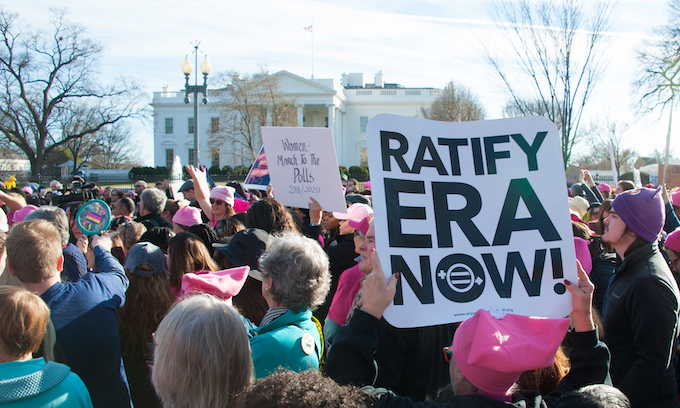Backers of the federal Equal Rights Amendment in Virginia got their decades-long wish last week when the new Democrat-controlled General Assembly reflexively resurrected and ratified the moldering constitutional amendment.
The Jan. 15 vote supposedly made Virginia the 38th state to ratify the ERA, putatively putting it over the top with approval of the necessary three-quarters of the states to enshrine it as the 28th Amendment to the U.S. Constitution.
It’s “supposedly” and “putatively” because the deadline for passage of the ERA came and went, either 38 or 41 years ago (depending on which of two deadlines it was given actually counts), and because five other states — Idaho, Kentucky, Nebraska, Tennessee and South Dakota — long ago rescinded their votes in favor. The latter means that Virginia is actually only the 33rd state, not the 38th, to ratify the amendment, which Congress passed and sent to the states in 1972.
Feminists fatuously insist, however, that neither the deadline(s) nor rescissions count. For them, it’s ratification forever, rescission never.
That calls to mind an editorial cartoon by three-time Pulitzer Prize winner Jeff MacNelly from 1978. The best political cartoonist of his era, MacNelly skewered the Democrat-controlled Congress for unfairly extending the seven-year deadline for passage from March 22, 1979, to June 30, 1982. (Stalled at 35 states at the time, it won no additional ratifications despite the 39-month extension.) MacNelly’s cartoon likened the ratification extension to a baseball game between the ERA and its opponents, one in which a Bella Abzug-like feminist figure had bound and gagged the scoreboard operator and had cobbled three extra innings onto the scoreboard — with three pre-emptive zeros on the ERA opponents’ line.
Virginia’s ratification is an entirely symbolic victory because — the state’s left-wing attorney general, Mark Herring, notwithstanding — no serious constitutional scholar believes ratification four decades after the deadline has any validity. (Nevada’s and Illinois’ ratifications in 2017 and 2018, respectively, are likewise constitutionally dubious.)
Whether they like it or not, ERA supporters would have to start again from scratch. They must pass it through Congress again with two-thirds majorities of both houses and send it back out to the states for a whole new round of ratifications.
The ERA likely would be an even harder sell today than it was in the 1970s, however, because it’s been rendered largely unnecessary. Sex discrimination against women today is far less prevalent, and less tolerated, than it was four decades ago, and laws at the local, state and federal levels, enacted since, are sufficient to address whatever vestiges of such discrimination remain.
It was always a cheap smear by the left that ERA opponents were somehow against equal rights for women. Opposition at the time was based primarily on the genuine fear that the vague wording of the amendment (“Equality of rights under the law shall not be denied or abridged by the United States or by any state on account of sex.”) would be seized upon by radical leftist lawyers to litigate for a “right” to abortion and same-sex marriage, and that liberal activist judges would unilaterally impose them. (Remember that this was in 1972, before the U.S. Supreme Court by fiat legalized abortion nationwide the following year and did likewise for gay marriage in 2015.)
But neither fiat has rendered opposition to the ERA moot. Pro-abortion forces could still use the ERA to litigate for the outlawing of any or all abortion restrictions, such as parental-notification laws, and state and federal bans on taxpayer funding of the procedure. And today, rather than same-sex marriage, opponents now contend that the ERA could be used as a legal battering ram by the minuscule, but disproportionately powerful, transgender lobby to force their way into the restrooms and locker rooms of their choice.
Thus, it’s a deliberate, calculated lie when ERA backers dismiss those concerns as baseless. Does anyone genuinely believe that if the ERA’s ratification were wrongly upheld as valid that the ACLU, Planned Parenthood and LGBTQ groups wouldn’t immediately run to state and federal courts seeking to impose their radical agendas?
ERA supporters in Virginia — and elsewhere — need to have their bluffs called on this point, to debunk their unpersuasive assertions that it wouldn’t happen. Any new ERA should include a proviso explicitly stipulating that the amendment cannot be construed or interpreted in any way as to confer any abortion or transgender rights. If its backers are honest, they would have no objections. Any opposition to such a stipulation on the flimsy grounds of wanting a “clean” amendment would expose the ERA for the Trojan Horse that it is.
© Copyright (c) 2020 News World Communications, Inc.
—-
This content is published through a licensing agreement with Acquire Media using its NewsEdge technology.



















Recent Comments